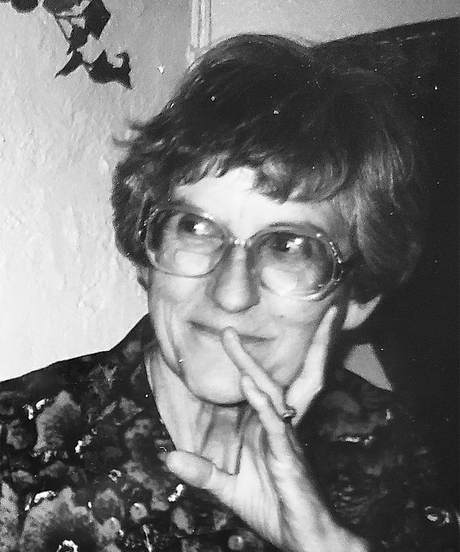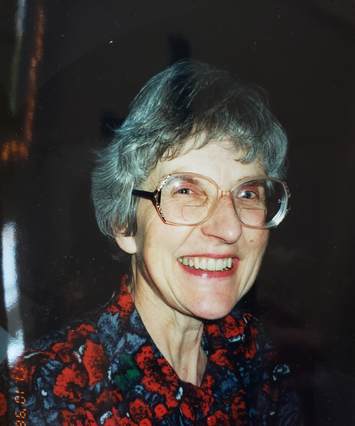When I think of Kathleen I think first of music and the many beautiful lyrical songs she composed. She wrote the first one on a long train journey from Madras (Chennai) to Pune in India, travelling through drought-ridden countryside. “Water for a thirsty land” was a personal testimony as well as a response to what she saw around her. Other memorable songs include Will we have rice tomorrow?, Who will break the chain of hate? and Mary’s Carol.
Kathleen was born in 1934 in Whitley Bay near Newcastle to parents Anne (nee Beswick) and Fred Johnson. He was a Tax Inspector and a Methodist lay preacher. Her sister, Christine, was born in 1938 in Leeds but sadly died 9 months later. By the beginning of World War II the family had moved to Launceston in Cornwall. From Kathleen’s notes it sounds like it was a busy and lively social life centred around the Methodist church. She also watched the Plymouth blitz from their attic and prayed each night that bombs would not hit their house, singing herself to sleep with Sunday school hymns.
She attended Horwell Girls School, Launceston and in 1945 won a scholarship to Queenswood School, Hatfield. Clearly it was a great place for music and among other things she played the violin and started to learn the organ. She seems to have been something of an outdoor girl mentioning cycling in Holland and rock climbing in the Lake District. When she was about 14 she made her first visit to Caux, Switzerland with her parents.
Kathleen was clearly very bright winning distinctions in her School certificate in English, French, Latin, History, Mathematics and Music. Not surprisingly she was “smothered” with suggestions for her future from teachers and parents. Then someone asked her what she enjoyed most and with the decision to study music came amazing peace of mind. In 1952 she went to the Royal Academy of Music for four years to study piano, violin and composition. She really enjoyed London life - concerts, operas, independent living in a student hostel. So when her parents moved to London she found it difficult to get used to living at home once more.
In 1955 she went to Caux again and on her 21st birthday she made a decision to have a quiet time every morning and follow the principles of MRA. She saw this as a crucial decision for her life although she did not always find it easy. On leaving the Royal Academy her MRA friends suggested that she should work with them as a telephone operator in the office. This did not appeal! Her mentor at the Royal Academy, Ernest Read, recommended her to Benenden School - a prestigious private school for girls - and he wrote “she has been one of the very best students I have ever had. She is a fine musician and a …good pianist”. After three years teaching there she went for a year to the Chatelard School in Les Avants, across the valley from Caux. Then she applied for a post in a school in London. The night before the interview she couldn’t sleep thinking that the job was not for her so in the morning she cancelled it.
This opened up for her a new life with MRA. At first she found it very hard to feel she had to give up classical music but the movement used large musical shows to promote its ideals and the next few years became for her an education in musical theatre. She joined the company of the show Space is so Startling which toured in various countries arriving in India late in 1963 to meet up with Rajmohan Gandhi’s March on Wheels campaign. She spent the next six years in India - touring, living in family homes, much in demand for training people in singing and music, sometimes with a bedroll on her back, a guitar and a water bottle on all kinds of transport. This was the time she started writing her own songs. Then another musical revue was born, India Arise, for which she composed the music. Some of the cast have written: “Her enthusiasm was infectious. As a result she was able to persuade the most unlikely of us to sing, and urge those who could to improve. That she managed to turn the motley collection of young people from all over India into a group that could actually perform a musical was more than a miracle!”
Back in the UK in the 1970s she became involved with theatre projects through the Westminster Theatre, London. Nancy Ruthven asked her to write the music for her adaptation of The Princess and the Goblin by George MacDonald. It was the first time Kathleen had a whole script to work on which she found stimulating and liberating. In 1973 she wrote the music for a satirical review, GB.
The highlight of these years was the creation with Hugh Williams in 1979 of a show for French mime artist, Michel Orphelin, on the life of St Francis of Assisi - Poor Man Rich Man. It brought her into close contact with musician John Burrows with whom she continued to work periodically for many years.
1985 brought a major change. On her birthday that year Essex county cricketer Dickie Dodds proposed marriage. They honeymooned in Thailand where Dickie was involved with an innovative development programme and then made their home near St Neot’s, Cambridgeshire. Dickie introduced her to the world of sport as well as bringing her into a new family.
The feature of more recent years was the creation of Renewal Arts of which Dickie and Kathleen were founding members. This group, linked to MRA/IofC, aims at bringing together artists of many disciplines and lovers of the arts who want to share the transforming power of the arts and explore them as a catalyst for spiritual renewal.
Kathleen worked closely with singer Sylvie Söderlund Haller">Sylvie Söderlund, from Switzerland and Sweden, giving a number of concerts over the years. Sylvie maintained a close contact with her and I acknowledge here the value of her loyal friendship to Kathleen.
Kathleen was a private person but generous with her time and talent, writing special pieces for friends including a song for her stepson, Michael’s wedding. After Dickie’s death in 2001 she moved to Godalming, Surrey. She died there on 16th January 2021 after a long period of poor health.
There have been many warm messages from her friends and so I end with a tribute sent by Christine Iralu from India: “How much we in India are indebted to her. She gave us a wealth of wonderful songs that we still sing today, and are as fresh and topical as they were when she first wrote them. Kathleen was never one to say much...a modest and gentle woman but I do think she had a sharp understanding of people and hit the nail on the head with some of the quartet songs she wrote! She has given us a wonderful heritage.”
English


